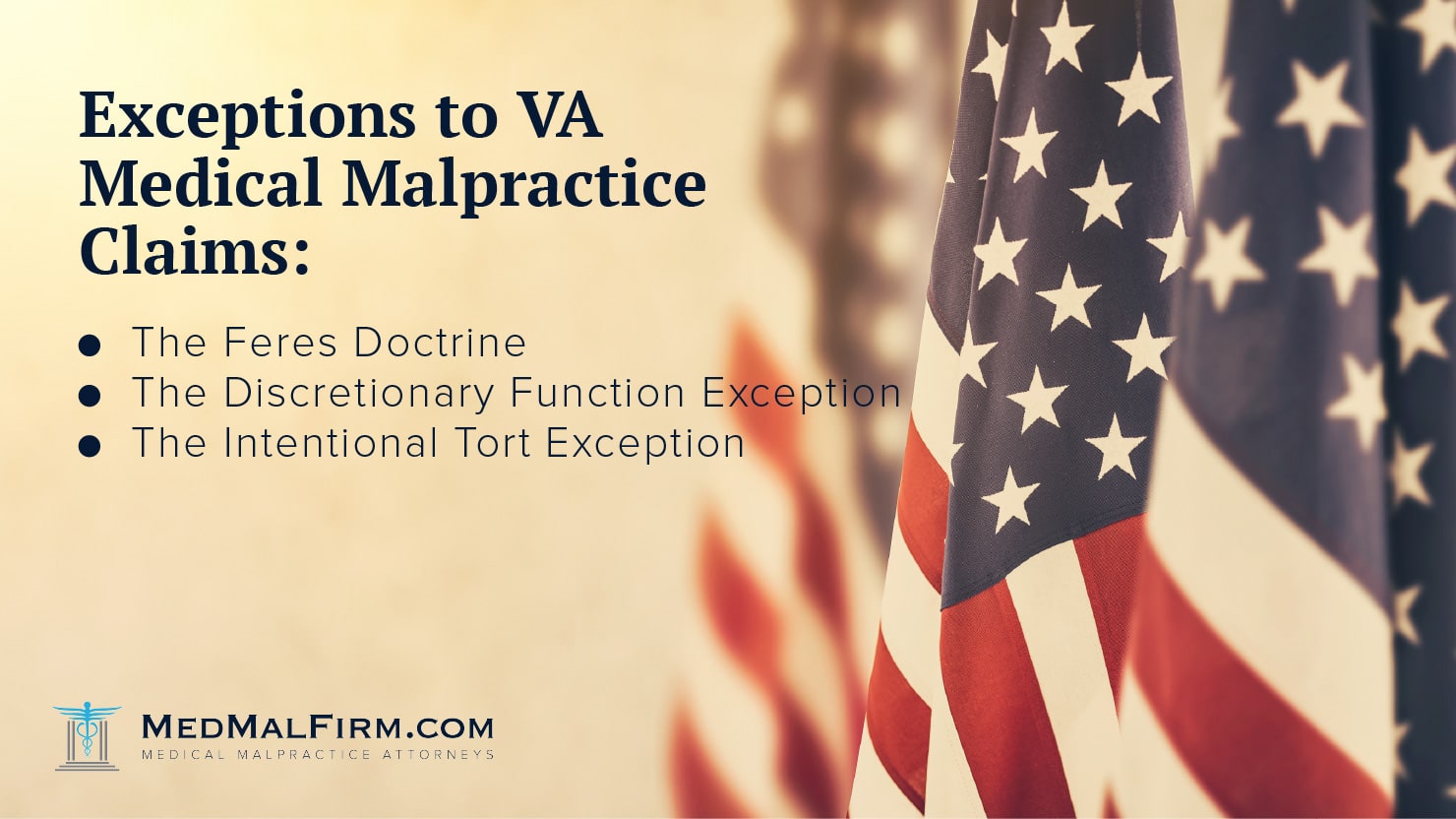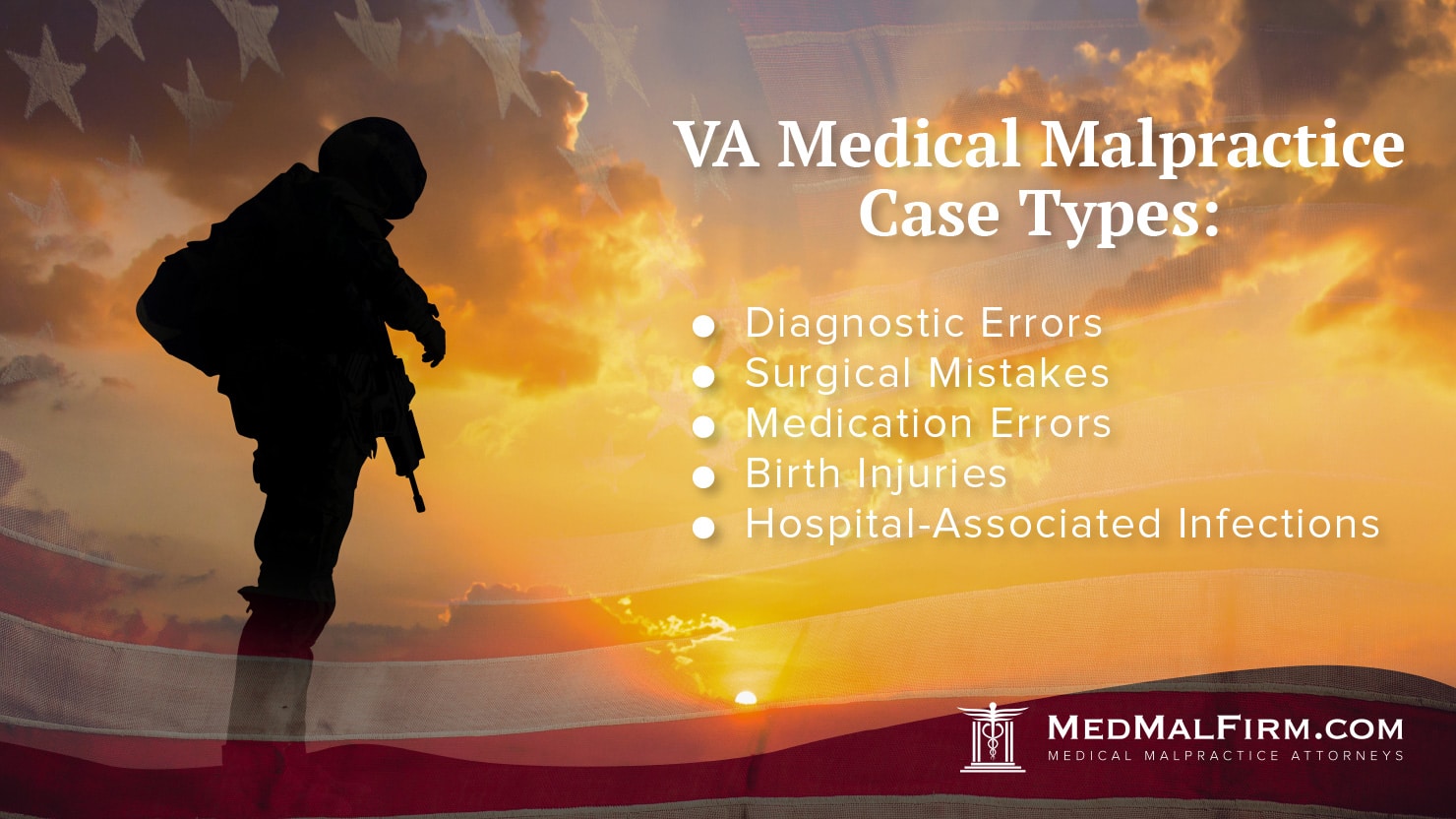VA Claims
If you or someone you love is in the military, it is inevitable that you will eventually find yourself seeking medical care from a military or veteran’s related doctor or hospital. Your family trusts that healthcare providers employed by the U.S. Department of Veteran’s Affairs (VA) will have the knowledge, skills, and mindset needed to heal and restore whatever ailments may arise. VA claims related to medical malpractice is likely not even on your radar.
Medical malpractice in VA hospitals, and among VA-employed healthcare providers, is a problem that seems to be growing in the United States. But what can you do if you or a family member suffered harm due to healthcare negligence? Government agencies are exempt from lawsuits, right? Not necessarily.
At MedMalFirm.com, we are here to dispel the myth that VA hospitals are immune from lawsuits. If you or someone you love has experienced medical malpractice or negligence while in the care of a VA hospital or healthcare provider, we want to help. Our team includes VA medical malpractice attorneys who are here to help you explore your legal rights and the options you have to pursue the compensation you deserve.
Can I Hire a Medical Malpractice Attorney to Sue the Veterans Administration for Medical Malpractice?
Depending on your military status, either alone or with the help of a Veterans Administration medical malpractice lawyer, you can bring a claim for injuries. A lawyer is not necessary but might be helpful when trying to navigate the rules that apply to military personnel and their dependents when trying to sue the VA for medical malpractice.
Suits against the VA are governed by the Federal Tort Claims Act (FTCA) (28 U.S.C. §§ 1346(b), 2671-2680). This law gives permission to claimants to bring a claim or a lawsuit against the United States government when certain conditions are met. Basically, with some exceptions, the U.S. is liable for the negligent actions of its employees just as if they were private employers.
So, subject to the exceptions below, if a claimant follows the rules contained within the FTCA, a claimant can sue the VA for medical malpractice.
What exceptions prevent a claimant from bringing a medical malpractice action against a VA hospital?
The FTCA contains several exceptions to the FTCA’s general rule that the U.S. is subject to suit just as if they were a private sector employer. The three most important exceptions are: (i) the Feres doctrine, (ii) the discretionary function exception, and (iii) the intentional tort exception.

The Feres Doctrine
The United States Supreme Court held in Feres v. United States (340 U.S. 135 (1950)) that the FTCA does not grant permission to military personnel for injuries sustained incident to military service. So, for example, a soldier cannot sue a superior officer or the United States for negligence. Without going into great detail here, the Court essentially said that it does not make sense for a soldier to be able to bring that lawsuit.
The Feres doctrine, while frequently criticized, has been upheld and applied to medical malpractice. So, until either Congress or the United States Supreme Court changes the law, military personnel who sustain injuries incident to military service are not able to bring a claim under the FTCA.
But what about the spouses and children of military personnel? What about military veterans? The Feres doctrine, in the VA medical malpractice context, does not seem to prevent most medical malpractice cases by the spouses or children of military personnel. The question for veterans would be whether or not the injury was incident to military service. If you have questions about whether the Feres doctrine applies to you or your family, you should seek out a free consultation with a Veterans Administration medical malpractice attorney.
The Discretionary Function Exception
The discretionary function exception to the FTCA is both significant and confusing. It provides that, even when an employee of the United States is negligent, the United States is not liable if the employee acted negligently in the performance or nonperformance of his discretionary function.
Any claim based upon an act or omission of an employee of the Government, exercising due care, in the execution of a statute or regulation, whether or not such statute or regulation be valid, or based upon the exercise or performance or the failure to exercise or perform a discretionary function or duty on the part of a federal agency or an employee of the Government, whether or not the discretion involved be abused (28 U.S.C. § 2680(a).
What is a discretionary function?
This exception is intended to protect the discretion of an executive or administrator to act according to his or her judgment where there is room for policy judgment and decision. It is impossible to perfectly outline this exception. The courts have given us guidance that is beyond the scope of this document. Determining whether or not a negligent act by a United States employee qualifies for the discretionary function exception requires both factual and legal research that depends on the individual’s case.
The Intentional Tort Exception
The intentional tort exception provides that the FTCA does not apply to certain torts that are known as intentional torts such as assault, battery, false imprisonment, false arrest, malicious prosecution, abuse of process, libel, slander, misrepresentation, deceit, or interference with contract rights. While it is possible that these issues could be raised in a medical malpractice context, for claims under the FTCA, the claims would be couched as negligence claims rather than intentional torts.
Any claim arising out of assault, battery, false imprisonment, false arrest, malicious prosecution, abuse of process, libel, slander, misrepresentation, deceit, or interference with contract rights: Provided, That, with regard to acts or omissions of investigative or law enforcement officers of the United States Government, the provisions of this chapter and section 1346(b) of this title shall apply to any claim arising, on or after the date of the enactment of this proviso, out of assault, battery, false imprisonment, false arrest, abuse of process, or malicious prosecution. For the purpose of this subsection, “investigative or law enforcement officer” means any officer of the United States who is empowered by law to execute searches, to seize evidence, or to make arrests for violations of Federal law (28 U.S.C. § 2680(h)).
The above provide the general rules that apply to whether or not a claimant can bring a claim against the U.S. for VA medical malpractice. This is only intended to be a start and is clearly not intended to decide whether any individual claim would succeed or have merit. If you have any questions, please let one of our Veterans Administration medical malpractice lawyers provide you with a free consultation.
Request a Free Consultation with Our VA Medical Malpractice Attorneys
If you or someone you love has been injured while under the care of a VA hospital or healthcare provider, you may be eligible to file a lawsuit and pursue compensation. At Patient Advocacy Group, our team can help you understand your legal rights and find the best options available to get the compensation you deserve. Request a free consultation with one of our skilled attorneys to get started.

Common Questions about VA Claims
Do I have a medical malpractice claim?
To qualify for a medical malpractice claim, you must prove the following elements in your claim:
- A doctor-patient relationship was established
- The provision of care (diagnosis, treatment, or a failure to treat) fell below the medical standards of care
- There is a clear causal connection between the medical negligence (act or omission) and the harm suffered by the patient
- The harm is quantified as damages (lost wages, medical expenses, pain and suffering, etc.)
How do you prevail in a medical malpractice case?
The laws surrounding medical malpractice are quite complex, and it is important to work with a law firm that knows how to handle this complicated area of the law. In order to be successful in a medical malpractice case, it is necessary to prove that the medical provider or facility acted negligently in the treatment provided to the patient. In order to prove that they were negligent, we must show that there was a duty owed to the patient, that the particular duty was breached, that the breach in the standard of care was the proximate cause of the injuries, and that there are damages associated with the negligent act.
I’ve never contacted a law firm before. Is this really what I should be doing?
Only you can answer that, but it does not hurt to talk about your concerns and potential medical negligence claim. Any information that you provide us during your initial consultation will remain confidential. The worst that can happen is that we explain that we cannot proceed with a claim at this time.
